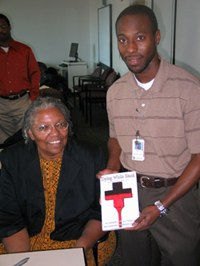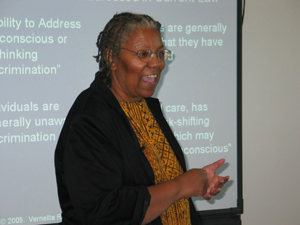 |
Vernellia Randall autographs copy of her book, “Dying While Black,” for Eric Spann, PACS Specialist II, department of radiology, The Nebraska Medical Center. |
That’s the belief of Vernellia Randall, professor of law at the University of Dayton (Ohio).
Randall shared her thoughts on how a new civil rights law is needed to address the issue of minority health care disparities during a special presentation at UNMC on Oct. 27. The next day, she presented the keynote speech at the awards banquet for the 2006 Nebraska Minority Health Conference in Kearney.
“Title VI has been useless in the area of racial discrimination,” said Randall, professor at the Dayton University School of Law since 1990. “You’ve got to have overt discrimination to get into courts. The only way to know if a doctor is discriminating is to know what that doctor does with people who are not like you. That information is not available to you.”
Title VI of the Civil Rights Act of 1964 is a national law that protects persons from discrimination based on their race, color or national origin in programs and activities that receive federal financial assistance. Individuals eligible for Medicaid, other health care, or human services, cannot be denied assistance because of their race, color or national origin. The Office for Civil Rights in the U. S. Department of Health and Human Services enforces Title VI, as well as other civil rights laws.
“The effort of the United States in ensuring equal access to quality health care has not only been ineffective and inefficient, but has also perpetuated racial discrimination,” she said.
Congress has enacted civil rights laws to address such specific rights as equal opportunities in employment, education and housing, Randall said, but has not given health care the same status.
She cited several problems with Title VI including:
- Little consistent data for evaluating Title VI compliance;
- Lack of uniformity in how different states handle Title VI requirements;
- Lack of statutory definition prohibits discrimination and acceptable remedial action; and
- Reliance on individual complaints as a means of enforcement.
“Health care discrimination is rarely overt or intentional discrimination,” said Randall, author of “Dying While Black.” Most health care discrimination is the result of unthinking bias or stereotypes or a disproportionate negative impact of policies, practices or procedures, she said.
“When someone tries to rent an apartment or purchase a home and is denied or directed to lesser properties because of their race, we call it ‘housing discrimination,’ we don’t call it ‘housing disparities,’ ” she said. “We must guard against giving the health professions a free pass just because they are in the business of helping people.”
Randall cited additional problems with the existing law including:
- An inability to address “unconscious” or “unthinking discrimination;”
- Individuals generally are unaware that they have been injured; and
- Individuals generally are unaware of discrimination.
To reduce health care discrimination, Randall proposes a new civil rights law that broadly defines who an “aggrieved person” is and makes all forms of discrimination illegal.
Institutional change is largely the result of economics or the law, Randall said, advocating for heavier fines and regulatory enforcement for discrimination cases. She also proposes widespread collection of comprehensive data by race to allow for better monitoring and reporting of discrimination cases.
“The groundwork for a new civil rights law needs to start now,” Randall said.
 |
Vernellia Randall speaks at UNMC last month. Randall, a widely-recognized educator, called for stronger civil rights laws during her UNMC appearance. |
A former nurse, Randall has written and spoken nationally and internationally on race and racism, health care, gender and academic support. She has received the Ohio Commission on Minority Health Chairman’s Award and was named one of the “Top 10 Most Influential African-Americans” on the 2001 Black Equal Opportunity Employment Journal list.
Since joining Dayton’s School of Law, Randall has served as a consultant to the Clinton administration advisory committee on health care reform and as a grant reviewer for the National Institute of Health. She also was an expert witness in the State of Missouri v. Philip Morris trial.
“We did not create the world we live in, but we are creating the world of the future,” Randall said. “We are directly responsible for the world our grandchildren will live in.”